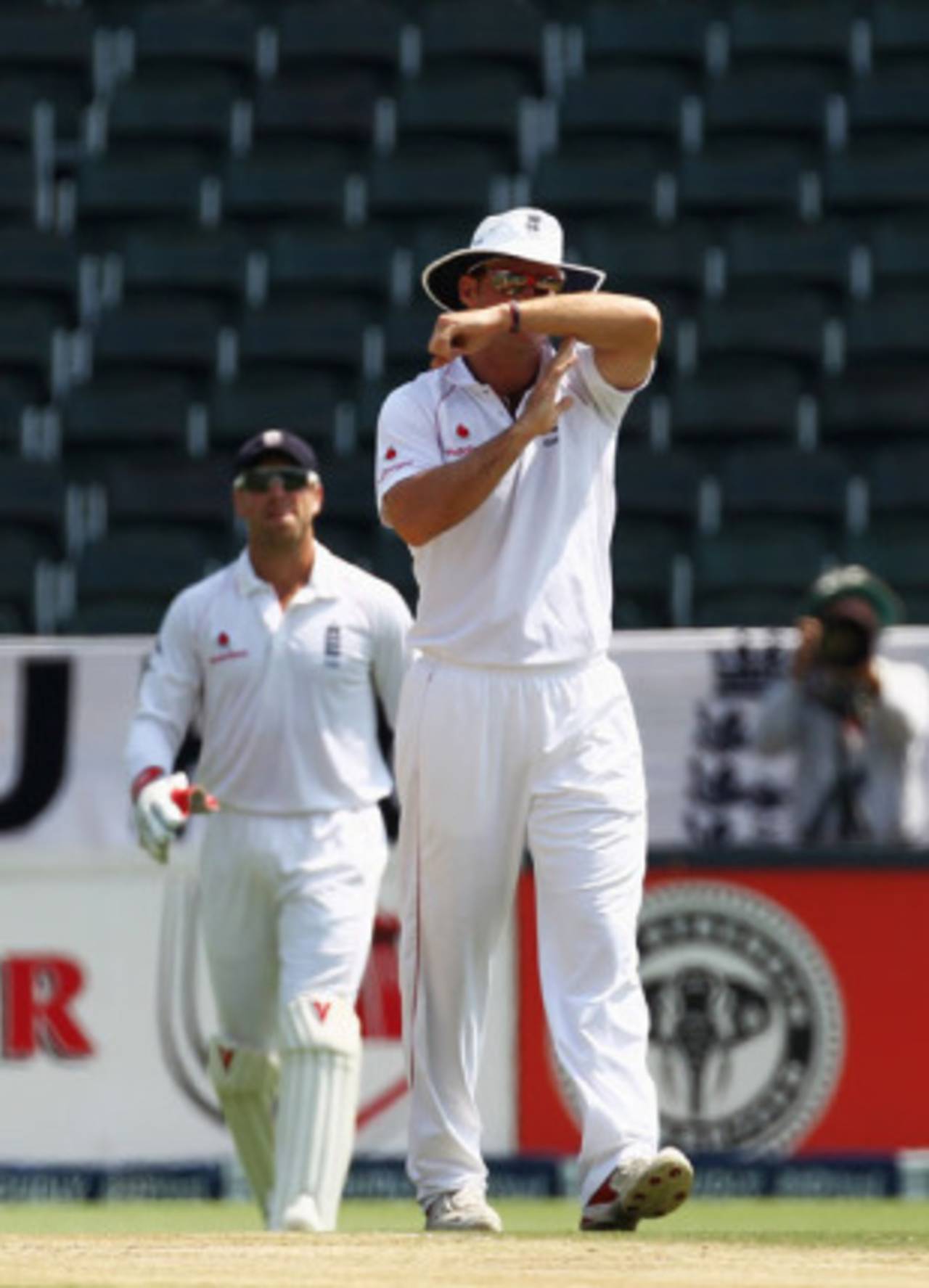Not for the first time
Daryl Harper has been caught at the centre of controversy over the Umpire Decision Review System (UDRS) and this time it sounds as though his failure to turn up the volume on his television set is to blame. It beggars belief.
When Graeme Smith, on 15, flashed a cut at Ryan Sidebottom England went up as one for the top edge, but Tony Hill, the on-field umpire, turned down the appeal and Andrew Strauss quickly asked for a review. There was no noticeable deflection on the replays so the noise from the stump microphone would have to be the decisive evidence. Except Harper couldn't hear anything, so he simply upheld Hill's decision.
It soon became clear that an edge was clearly audible on subsequent replays. How did Harper fail to hear the nick, which commentators said was as clear as they come from the stump microphone? Before the series an agreement was reached that the third umpire would set his volume level to four out of 10, but there is nothing to prevent him turning it up to assess a decision, should the need arise. Initially it was suggested the feed provided to Harper hadn't included the audio, but it later emerged that he had merely committed a bungle of the highest order, and this coming from an umpire who has a history of embarrassing errors.
It led Andy Flower, the England coach, to make an official complaint to Roshan Mahanama, the ICC match referee, who has also had a curious part to play in the whole affair after first telling Flower, incorrectly, that he had a different TV feed. It was only after England made further investigations and found out this wasn't true that Mahanama admitted Harper had failed to adjust his volume.
Harper was also the TV umpire during the England series in West Indies early last year, when he was unable to rule on a caught-behind appeal against Darren Powell. It transpired that, on that occasion, he was let down by the hardware because his TV screen wasn't wide enough to include the whole picture and the ball was lopped off. The ICC have put measures in place to ensure such situations don't arise again.
But later in the series, at Barbados, Harper failed to overturn an lbw against Shivnarine Chanderpaul that was clearly heading over the stumps, although at that stage of the UDRS trial, the predicative element of Hawkeye wasn't available to the TV umpire. All the same, regardless of the possible defences for Harper in those situations, a system is only as good as the people operating it - and faith in Harper's decision-making is currently at rock-bottom.
On the whole, the review system has emerged from this series with its reputation boosted after an iffy start in Centurion, during which the main issue was the length of time taken to ask for reviews. At Cape Town it was especially impressive as it overturned three glaring errors; a caught-behind against Ashwell Prince, an lbw against Kevin Pietersen when he inside-edged the ball and, most crucially, a first-ball slip catch at the start of Paul Collingwood's match-saving rearguard, when the ball deflected off his back leg. Ironically, the Prince and Pietersen errors were both made by Harper, the standing umpire, but that is what the system was designed for and it worked.
However, this latest controversy again highlights the problem of UDRS's inconsistent implementation around the world. In this series there is neither HotSpot nor Snickometer technology, and either of those would have offered a definitive answer to the question of Smith's edge. The lack of HotSpot is due to there being only four cameras in the entire world and they are all in Australia where, despite Mark Benson's walkout at Adelaide following an overturned decision against Chanderpaul, it has proved effective.
If the ICC wants to implement the review system successfully it has got to go the whole hog with the available technology. The current piecemeal compromise isn't acceptable. HotSpot isn't cheap, but the ICC isn't so short of money that it can skimp on the provision of enough cameras to deploy around the world as required. This isn't to say ICC should be left with the entire cost of the system, but HotSpot is looking like an important piece of equipment that should be made available.
Of course, as the Chanderpaul incident showed, it won't eliminate controversy 100%, but the ICC has admitted that such a situation will never be achieved and they are aiming for a success rate of around 98% of correct decisions. There has been enough evidence in this series to prove that the system does work, but only with people more competent than Harper in the hot seat
Andrew McGlashan is assistant editor of Cricinfo
